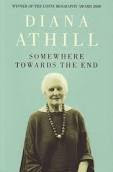
SOMEWHERE TOWARDS THE END begins in an easy chatty manner, with Athill looking out the window, watching dogs play. She comments:
I have always wanted a pug and now I can’t have one, because buying a puppy when you are too old to take it for walks is unfair.
Then she talks about having recently ordered a tree fern, which turned out to be just a seedling:
Whether tree ferns grow quickly or slowly I don’t know, but even if it is quickly, it is not possible that I shall ever see this one playing the part I envisaged in our garden
.
Athill is clearly an elderly lady, and this it emerges is her theme:
We have, however, contrived to extend our falling away so much that it is often longer than our development, so what goes on in it and how to manage it is worth considering. Book after book has been written about being young, and even more of them about the elaborate and testing experiences that cluster around procreation, but there is not much on record about falling away. Being well advanced in that process, and just having had my nose rubbed in it by pugs and tree ferns, I say to myself: ‘ Why not have a go at it?” So I shall.
It’s true there is little in literature about being old, despite the fact that this will soon be a very long period of our ever longer lives, so I was interested to hear her perspective.
The main thing I gained from this novel is that, at least for Athill, as we grow older, we grow more accepting of death, which is comforting. I did struggle somewhat with the extent to which she drew on her response to her parents’ death as a model. Both her parents died when she was in her sixties and they in her eighties, so with respect I think she has little idea as to what early loss of those two people can be.
I strongly suspect Athill was a bit of a looker, because much of her book is taken up with her lovers. One, for a relatively brief period, was a man Sam, and she comments: “after his death Sam became more vivid in my mind than many of my more important dead. I saw him with photographic clarity – still do.” I love that phrase – ‘my more important dead’ – it seems to me to really capture what it means to have lived a long time. Thankfully my list of important dead is short, and I am not sure if I want to live long enough for it to become long.
Curiously, as with Montaigne, a biography of whom I will review next, she seems to come to some sort of conclusion around life being worth living in and of itself. At the end, of the fern, she explains that it is growng fast, and comments:
I was right in thinking that I will never see it being a tree, but I underestimated the pleasure of watching it being a fern. It was worth buying.
